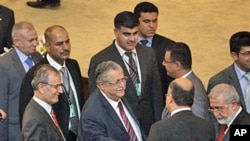On March 7th, the people of Iraq voted for a new Parliament. Despite a concerted effort by violent insurgents to intimidate voters and scare them away from polling stations, over 62 percent of eligible voters in Iraq turned out to cast their ballots. After 8 months, the voters' expectations of a new government are finally being realized.
The political scene in Iraq is multi-faceted and competition is fierce. To fill the 325 seats on the Council of Representatives, Iraqi voters chose candidates from among several thousand fielded by 306 political entities.
What followed the election was 8 months of indecision. When the post-election dust settled, the 2 major coalitions were virtually tied, and attempts to form a ruling coalition resulted in grandstanding rather than productive negotiations. The country found itself in a state of political paralysis.
Now, however, there is a light at the end of the tunnel: the Iraqi Parliament approved on November 13th a power-sharing agreement, and the outline of a new government. Under the proposed deal, the 3 major governmental positions will be filled by members of the country's 3 largest ethnic groups. Sitting President Jalal Talabani, a Kurd, will retain his position. Prime Minister Nuri al-Maliki, a Shi'ite, will stay for a second term and form a government within 30 days, as mandated by the constitution.
And a member of the Sunni bloc Iraqiyya will head the new National Council on Strategic Policies, a position with the ability to put a check on the Prime Minister's power.
"This agreement ensures meaningful representation for the election winners, encompassing all of Iraq’s ethnic and sectarian communities," said U.S. Secretary of State Hillary Clinton. "It is now up to this government to deliver on an inclusive, comprehensive agenda that serves all Iraqis and strengthens the country as a whole," she said.
"As Iraqis continue their progress, they will have a committed and consistent partner in the United States."
Iraq's Eight Lost Months

After 8 months, the voters' expectations of a new government are finally being realized.

















